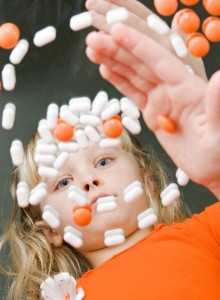
Attention Deficit Hyperactivity Disorder (ADHD) is the most common behavioural disorder in the UK, with sufferers experiencing inattentiveness, hyperactivity, and impulsivity.
It is estimated to affect 3-9% of school aged children and young people in the UK (those aged 3 to 18), and 2% of adults worldwide (DSM-IV criteria).
Typically ADHD will continue from childhood into adulthood with many experiencing occupational problems, emotional and social difficulty, psychiatric disorders, or substance abuse.

ADHD usually continues into adulthood, although most research focuses on children and young people
Last month NICE published both Quality Standards and an Evidence Update for ADHD. The Quality Standards are a set of brief statements designed to improve the quality of healthcare. They’re aimed at health professionals, patients, service providers, and commissioners.
The Evidence Update provides a roundup of the new evidence since their last review in 2008. This is the first update in 5 years, but none of the new key points were indicated as having a potential influence to change current NICE guidance.
The 7 Statements in the Quality Standard:
- Children and young people with symptoms of ADHD are referred to an ADHD specialist for assessment
- Adults who present with symptoms of ADHD who do not have a childhood diagnosis of ADHD are referred to an ADHD specialist for assessment
- Adults who were diagnosed with and treated for ADHD as children or young people, and present with symptoms of continuing ADHD are referred to general adult psychiatric services
- Parents or carers of children with symptoms of ADHD who meet the NICE eligibility criteria are offered a referral to a parent training programme
- Children and young people with moderate ADHD are offered a referral to a psychological group treatment programme
- People with ADHD who are starting drug treatment have their initial drug dose adjusted and response assessed by an ADHD specialist
- People with ADHD who are taking drug treatment have a specialist review at least annually to assess their need for continued treatment
Quality Statements and Evidence Update Summary
Specialist referral

Adults with ADHD who have grown up with the condition often struggle to get the support they need once they have left the care of child services
Children and adults should be sent to a specialist when they first show symptoms of ADHD. Meanwhile adults who were previously treated as children should be referred to general psychiatric services. Practitioners should take care to prevent a reduction in support when patients move from child to adult services. It’s important that individuals of all ages with ADHD receive support, as adequate treatment can have long-term benefits on a range of ADHD outcomes (Shaw et al, 2012).
Diagnosis
Individuals with ADHD may have significantly reduced grey matter volume in the basal ganglia. However, the normal course of ageing and stimulant drug treatment may be associated with brain areas appearing more normal (Nakao et al, 2011).
Post diagnosis

More research is needed on the impact that diet can have on ADHD prevention and treatment
Two dietary interventions have been investigated. One review found that some children with ADHD responded positively to a diet without food colourings and additives (Sonuga-Barke et al, 2013). Another review assessed treatment through a fatty acid supplement, which appeared to reduce symptoms. Both interventions require further research (Gillies et al, 2012).
Patient and parent therapy
Children with moderate ADHD should be referred to group therapy to improve daily functioning, organisational skills, and relationships with peers and family members. It’s recommended that parents attend training programmes which can provide them with the tools and experience needed to manage their children’s behaviour while strengthening parent-child relationships. Telephone-based training for parents may be beneficial compared to no training, although further research is needed (McGrath et al, 2011). It should be noted that parental training showed little impact on ADHD symptoms outside the home environment (Zwi et al, 2011).
Drug treatment
It is suggested that patients should be closely monitored when starting a new drug, to allow the dose to be successfully adjusted. This means unwanted side effects can be minimised, and benefits maximised. Side effects of ADHD drugs can include a small increase in blood pressure and heart rate, which can subsequently increase the risk of other cardiovascular problems (Martinez-Raga et al, 2013). Therefore, patients should be monitored yearly, due to the high levels of side effects in ADHD medicine which can hinder the course of ADHD treatment. Regular patient reviews will also decrease the risk of abusing medication.
Drug treatment for children

Drugs such as methylphenidate are reserved for severe cases of ADHD and not recommended for first line treatment
Current clinical guidelines recommend drug treatment should not be the first-line treatment for children, instead reserved for those individuals with severe symptoms, whom have refused behavioural interventions, or are non-responsive to alternative treatments.
Drug treatment in school age children may increase attention, although the evidence is less clear on whether it can increase academic performance. Methylphenidate appears to be an effective treatment for children & young people with ADHD as well as intellectual disabilities or substance abuse problems (Prasad et al, 2013).
Drug treatment for adults
Treatment for ADHD in adults may be improved with the aid of cognitive behavioural therapy (CBT) alongside medication. Extended-release methylphenidate may reduce ADHD symptoms in incarcerated adults and those with other health problems alongside ADHD (Ginsberg & Lindefords 2012).

This doctor likes to keep his finger on the pulse and now he can with this update of the latest ADHD research
While none of the key findings in the Evidence Update had a large enough impact to change any of the current NICE Clinical Guidelines, they bring us up to speed with the latest evidence and point to where to go next. Additionally, the Quality Standards offer recommendations on the treatment of ADHD based on the current evidence. Group-based treatment is recommended for children with moderate symptoms and for parents of affected children. If drugs are prescribed they must be closely monitored and annually reviewed due to the adverse effects and risk of abuse.
For adult care, it is important to continue treatment in psychiatric services when transferring from child to adult practices. Drugs are the first line of treatment, with methylphenidate as the drug of choice followed by atomoxetine and dexamfetamine. If symptoms persist, then patients may be referred to Cognitive Behaviour Therapy.
The Evidence Review also brought fourth many additional uncertainties and opportunities for future research, such as the impact of restricted diets on ADHD symptoms, organisational-skills training as an effective behavioural intervention for children, and whether the assessment of brain abnormalities may some day be part of the ADHD assessment process.
Links
Attention deficit hyperactivity disorder (PDF). NICE Evidence Update 45, July 2013.
Attention deficit hyperactivity disorder. NICE Quality Standard 39, July 2013.
Attention deficit hyperactivity disorder: Diagnosis and management of ADHD in children, young people and adults. NICE Clinical Guideline 72, September 2008.
Gillies D, Sinn JKH, Lad SS et al. (2012) Polyunsaturated fatty acids (PUFA) for attention deficit hyperactivity disorder (ADHD) in children and adolescents. Cochrane Database of Systematic Reviews issue 10: CD007986.
Ginsberg Y, Lindefors N (2012) Methylphenidate treatment of adult male prison inmates with attention-deficit hyperactivity disorder: randomised double-blind placebo-controlled trial with open-label extension. British Journal of Psychiatry 200: 68–73.
Martinez-Raga J, Knecht C, Szerman N et al. (2013) Risk of serious cardiovascular problems with medications for attention-deficit hyperactivity disorder. CNS Drugs 27: 15–30. [Abstract]
McGrath PJ, Lingley-Pottie P, Thurston C et al. (2011) Telephone-based mental health interventions for child disruptive behavior or anxiety disorders: randomized trials and overall analysis. Journal of the American Academy of Child & Adolescent Psychiatry 50: 1162–72. [Abstract]
Nakao T, Radua J, Rubia K et al. (2011) Gray matter volume abnormalities in ADHD: voxel-based meta-analysis exploring the effects of age and stimulant medication. American Journal of Psychiatry 168: 1154–63.
Prasad V, Brogan E, Mulvaney C et al. (2013) How effective are drug treatments for children with ADHD at improving on-task behaviour and academic achievement in the school classroom? A systematic review and meta-analysis. European Child & Adolescent Psychiatry 22: 203–16. [Abstract]
Shaw M, Hodgkins P, Caci H et al. (2012) A systematic review and analysis of long-term outcomes in attention deficit hyperactivity disorder: effects of treatment and non-treatment. BMC Medicine 10: 99.
Sonuga-Barke EJS, Brandeis D, Cortese S et al. (2013) Nonpharmacological interventions for ADHD: systematic review and meta-analyses of randomized controlled trials of dietary and psychological treatments. American Journal of Psychiatry 170: 275–89. [Abstract]
Zwi M, Jones H, Thorgaard C et al. (2011) Parent training interventions for attention deficit hyperactivity disorder (ADHD) in children aged 5 to 18 years. Cochrane Database of Systematic Reviews issue 12: CD003018.


NICE publish new Quality Standard and Evidence Update on ADHD: Attention Deficit Hyperactivity Disorder (ADHD)… http://t.co/OPW1PUXeox
My first blog for @Mental_Elf on the new NICE Quality Standard & Evidence Update on ADHD http://t.co/lzIu78Fv8W
@MegEliz_ @mental_elf nice one Megatron!
Debutant blogger @MegEliz_ summarises the new @NICEcomms #ADHD Quality Standard & Evidence Update http://t.co/Eu66we9o5J
@Mental_Elf @MegEliz_ @NICEcomms #Seriously #stopdruggingkids #dearmentalhealthprofessionals
@Mental_Elf @MegEliz_ @NICEcomms #ADHD is made up and #Drugs lead to #Addiction
Keep in touch with the latest reliable ADHD research highlighted by @NICEcomms http://t.co/Eu66we9o5J
NICE Quality Standards and Evidence Update on Attention Deficit Hyperactivity Disorder (ADHD) – The Mental Elf http://t.co/kqPckQyuXx
Children & young people w/ ADHD symptoms should be referred for an ADHD specialist assessment says @NICEcomms http://t.co/Eu66we9o5J
@Mental_Elf @NICEcomms unfortnatly not enough specs around, wait lists usually 6m or longer where there is 1.that’s if u can get GP 2 refer
Children/young people w/ moderate ADHD shld be offered psychological group treatment referral says @NICEcomms http://t.co/Eu66we9o5J
NICE Quality Standards and Evidence Update on Attention Deficit Hyperactivity Disorder (ADHD) -… http://t.co/bPXVgIv6y4
Ppl on drugs for ADHD shld have annual specialist review to assess ongoing need for treatment says @NICEcomms http://t.co/Eu66we9o5J
More research is needed on the impact that #diet can have on #ADHD prevention and treatment says @NICEcomms http://t.co/Eu66we9o5J
http://t.co/xbms6SmUfc
Mental Elf: NICE publish new Quality Standard and Evidence Update on ADHD http://t.co/W8Gxb2axj7
From @Mental_Elf NICE publish new Quality Standard and Evidence Update on #ADHD http://t.co/ellWCWYQ0c
[…] NICE publish new Quality Standard and Evidence Update on ADHD […]